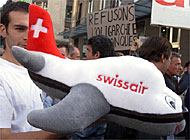
Swissair crisis continues

Once more the crisis facing Swissair and plans to launch a new national airline have been dogged by controversy.
With the government, local authorities, banks and business leaders still discussing plans to save the country’s airline industry arguments have raged about the likelihood of the plans’ success.
Employees at Swissair, which collapsed at the start of the month under a huge debt burden, were among the most concerned as they petitioned the government for state support to keep Swissair flying until a planned takeover of routes by Crossair.
Under the plan, Crossair would take over two-thirds of the Swissair fleet in two stages – its European flights on October 28 and its intercontinental service by the end of March.
This scenario envisages Crossair needing to raise around SFr2.2 billion francs in fresh capital while up to another SFr1.7 billion is needed to sustain Swissair’s long distance flights until the end of March. Hundreds of millions more francs could be needed to finance thousands of layoffs.
On Wednesday, the Swiss government said it was willing to help rescue the national airline industry in the wake of the collapse of the Swissair Group, but made it clear that it would only do so if the private sector provided a large chunk of the required funds.
However, the idea of government aid has already come in for criticism from the European Union. Under EU regulations any government handouts to national airlines are frowned upon and subject to strict regulation.
Sales rush at Roche
In other business news, sales at the Basel-based drugs company, Roche, grew faster in the third quarter of the year, helping boost sales revenue by eight per cent for the first nine months of the year.
Roche forecast on Tuesday that its 2001 operating profit would at least match last year’s level and said its net income would hold steady near the first half level of SFr1.5 billion ($914 million).
Nine-month drug sales rose seven per cent to SFr13.8 billion ($8.4 billion). They had risen just five per cent in the first half but grew by 10 per cent in the third quarter due mainly to cancer drug sales.
Swisscom stake
On Wednesday the government announced it had postponed until next year a decision on selling its majority stake in Swisscom so it can study alternatives for the operator’s future.
A statement from the cabinet office said the government believed there was now less pressure for a quick decision.
Back with results was Swiss manufacturing group Sulzer. It said on Thursday that sales in its core businesses rose 25 per cent in the first nine months of the year to SFr1.47 billion ($901.8 million).
The week ended on a high point as the world’s largest food group, Nestlé, said on Friday that sales over the first nine months of the year increased 4.9 per cent over the same period last year
The sales totalled SFr62.4 billion ($38.1 billion) for the period.
Nestlé also reported that it was considering a possible initial public offering of a minority stake in Alcon, its wholly-owned eye care business.
by Tom O’Brien

In compliance with the JTI standards
More: SWI swissinfo.ch certified by the Journalism Trust Initiative




























You can find an overview of ongoing debates with our journalists here . Please join us!
If you want to start a conversation about a topic raised in this article or want to report factual errors, email us at english@swissinfo.ch.